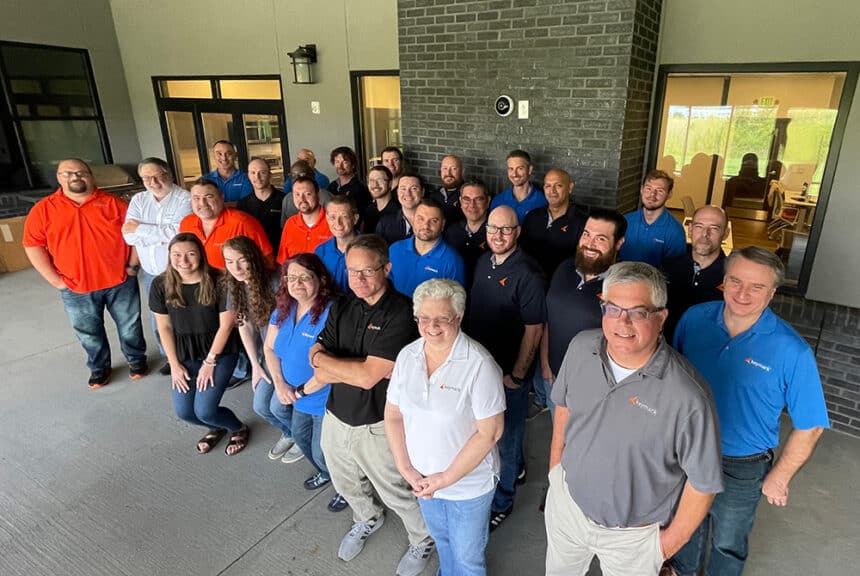Four Ways to Wield Automation for a Happy and Healthy Future
The end of each year is packed with travel, opportunities to see family, hugs, kisses, handshakes, and holiday parties. And with all that holiday cheer comes the many recommendations by medical professionals and common sense alike to keep your physical form healthy throughout it all. Recommendations like wash your hands, don’t touch your face, get plenty of sunshine and sleep, drink your orange juice, and so on.
While that’s all well and good for the holidays, come the end of Q3, businesses are already planning ahead for the new year, considering strategies that’ll help them stay fiscally “healthy” for whatever awaits in the future.
KeyMark is not a medical or economic authority, nor will automation help you fight the flu. But what we can do, is remind you of some key ways and best practices that’ll help you do more with less — a valuable skill to have during recession times or moments of scarcity.
So regardless of whether you think a recession is currently here or that it will occur sometime in the New Year, here are four ways you can wield automations to do more with less during financial scarcity.
#1 Know the Benefits of Automation for your Industry
As reported in a recent survey by Deloitte, automation tech upgrades can improve your costs savings by “at least” 30%, and growing. Whether your industry is considered “recession-proof” or not, everyone has something to benefit from business process technology. The key is understanding some common pain points that automation can relieve for you.
Consider how automation improves these common industry functions.
#2: Assess Your Processes
We use the phrase, “What You Don’t Know, Could Cost You”. In essence, it means that there is likely a process or processes weighing down productivity, your bottom line, or both. Even your previously automated processes can fail overtime if they haven’t scaled with your organization’s changing objectives. But how can you fix problems if you don’t know they’re there?
We recommend you start by inspecting highly repeatable, tedious, or time-sensitive processes, as these are low-hanging fruit processes with a fast ROI. Outside of that, look for processes in departments that commonly benefit from automation, including:
- Accounts Payable/Receivable
- Human Resources
- Customer Relations/Front Office
- Mailrooms
Process mining and assessment tools can be deployed at the beginning of your survey to quickly observe, identify, and codify existing processes with the most significant improvement and cost-saving opportunities. Unfortunately, as it stands, these strategies go underutilized, with only 1-in-5 digital transformers using assessment strategies to optimize performance. But process mining should not be ignored.
According to a survey, 41% of automation users meeting aggressive targets for enterprise-wide automation have done so by relying on assessments and process mining tools. Additionally, a separate survey found that 82% of digital transformers, at the very least, agree that using process mining drives better outcomes than not — source.
If you are interested in the capabilities of process mining and assessments, there are two main avenues to deploy such tools.
- Rely on IT or an in-house tech savant to apply low-code or no-code software. The downside is that only some have access to such talent (more on that soon!).
- Alternatively, an experienced partner can wield process mining tools in an assessment to rapidly vet your entire system of processes, sometimes at no or low cost depending on the scope. Learn more about KeyMark process assessments here!
#3 Attract or Nearsource
Digital transformation will require digitally savvy talent. Unfortunately, such talent is in high demand and limited supply. We’ve covered this topic of The Big Quit extensively, and to echo those past blogs, extreme effort should be committed to attracting new talent. HR specifically can benefit from automation strategies that support onboarding and offboarding initiatives to this end. And just like those pesky doctor’s orders, we’ll continue to be redundant on that truth — it’s just that important.
Additionally, and coincidentally, the very existence of integrated automation capabilities has shown signs of being a central selling point for employees searching for work. According to a recent UiPath study, 85% of U.S. business executives find that positive automation infrastructure increases the ability to attract top talent.
All that said, recession accompanies scarcity, and not everyone will have the capacity to hire, train, and support new employees if resources become particularly limited. That’s where outsourcing, or as we like to call it, near sourcing, comes into play. For more on this topic, read our blog — What We Mean by Outsourcing.
In short, near sourcing is a form of outsourcing closer to your backyard. KeyMark offers near sourcing programs like document processing and dedicated resource initiatives to benefit organizations that want access to top talent and services without incurring expensive costs. In these scenarios, KeyMark handles all sourcing, training, office space, turnover management, and other overhead expenses of your talent or service.
#4 Retain and Retrain
Our last point has even more to do with talent management. The use of automation is rapidly growing, with digital transformation and enterprise-wide automation a recurring trend. With its rise in popularity comes a need for organizations to reconfigure and maximize their existing workforce to better service a digital ecosystem. And we’ve already seen such a change taking effect. As indicated by a Deloitte study, 34% of surveyed workers reported that their roles have shifted in favor of automation-augmented positions. As such, if retaining and retraining your available workforce isn’t a major consideration — it should be.
What comes next is likely a spike in demand for highly strategic, forward-thinking, and digitally equipped decision-makers to champion the rapidly expanding markets of artificial intelligence in automation. Don’t get left behind.
What You Don't Know Could be Costing You
Set up a brief time with one of our (real) friendly humans to learn more about assessments, and start your free or low-cost optimization journey.



